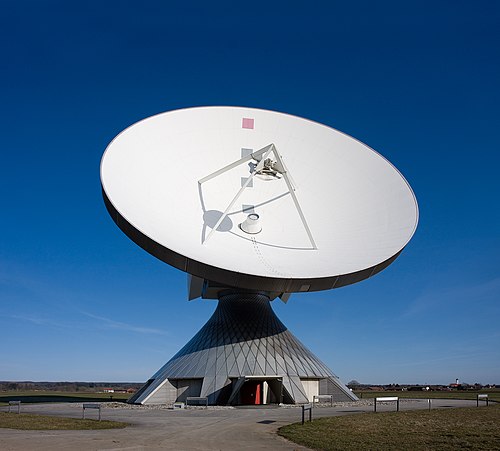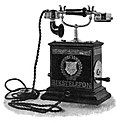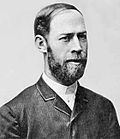Portal:Telecommunication
The Telecommunication Portal

Telecommunication, often used in its plural form or abbreviated as telecom, is the transmission of information over a distance using electronic means, typically through cables, radio waves, or other communication technologies. These means of transmission may be divided into communication channels for multiplexing, allowing for a single medium to transmit several concurrent communication sessions. Long-distance technologies invented during the 20th and 21st centuries generally use electric power, and include the telegraph, telephone, television, and radio.
Early telecommunication networks used metal wires as the medium for transmitting signals. These networks were used for telegraphy and telephony for many decades. In the first decade of the 20th century, a revolution in wireless communication began with breakthroughs including those made in radio communications by Guglielmo Marconi, who won the 1909 Nobel Prize in Physics. Other early pioneers in electrical and electronic telecommunications include co-inventors of the telegraph Charles Wheatstone and Samuel Morse, numerous inventors and developers of the telephone including Antonio Meucci, Philipp Reis, Elisha Gray and Alexander Graham Bell, inventors of radio Edwin Armstrong and Lee de Forest, as well as inventors of television like Vladimir K. Zworykin, John Logie Baird and Philo Farnsworth.
Since the 1960s, the proliferation of digital technologies has meant that voice communications have gradually been supplemented by data. The physical limitations of metallic media prompted the development of optical fibre. The Internet, a technology independent of any given medium, has provided global access to services for individual users and further reduced location and time limitations on communications. (Full article...)
Selected article -
The Submarine Telegraph Company was a British company which laid and operated submarine telegraph cables.
Jacob and John Watkins Brett formed the English Channel Submarine Telegraph Company to lay the first cable across the English Channel. An unarmoured cable with gutta-percha insulation was laid in 1850. The recently introduced gutta-percha was the first thermoplastic material available to cable makers and was resistant to seawater. This first unarmoured cable was a failure and was soon broken either by a French fishing boat or by abrasion on the rocks off the French coast. (Full article...)
General images
Things to do
 |
Here are some tasks awaiting attention:
|
Selected biography -
Thomas Alva Edison (February 11, 1847 – October 18, 1931) was an American inventor and businessman. He developed many devices in fields such as electric power generation, mass communication, sound recording, and motion pictures. These inventions, which include the phonograph, the motion picture camera, and early versions of the electric light bulb, have had a widespread impact on the modern industrialized world. He was one of the first inventors to apply the principles of organized science and teamwork to the process of invention, working with many researchers and employees. He established the first industrial research laboratory.
Edison was raised in the American Midwest. Early in his career he worked as a telegraph operator, which inspired some of his earliest inventions. In 1876, he established his first laboratory facility in Menlo Park, New Jersey, where many of his early inventions were developed. He later established a botanical laboratory in Fort Myers, Florida, in collaboration with businessmen Henry Ford and Harvey S. Firestone, and a laboratory in West Orange, New Jersey, that featured the world's first film studio, the Black Maria. With 1,093 US patents in his name, as well as patents in other countries, Edison is regarded as the most prolific inventor in American history. Edison married twice and fathered six children. He died in 1931 due to complications from diabetes. (Full article...)
Did you know (auto-generated) -

- ... that Debra Lew Harder is the fifth person to host the Metropolitan Opera radio broadcasts since they began in 1931?
- ... that country music singer Waylon Jennings earned his GED by watching tapes of a Kentucky Educational Television series on his tour bus?
- ... that a Louisiana radio station went to a satellite-fed music format because it had more control than with its previous "18- and 20-year-old jocks"?
- ... that officials of the Worcester Bus Company blamed television for declining ridership?
- ... that in Jackson, Tennessee, there was a 50–50 chance a reference to Dixie was about a radio station?
- ... that the angel's wings in the live-action television-drama adaptation of One Room Angel took about a month to construct?
Related portals
Topics
Subcategories
Associated Wikimedia
The following Wikimedia Foundation sister projects provide more on this subject:
-
Commons
Free media repository -
Wikibooks
Free textbooks and manuals -
Wikidata
Free knowledge base -
Wikinews
Free-content news -
Wikiquote
Collection of quotations -
Wikisource
Free-content library -
Wikiversity
Free learning tools -
Wiktionary
Dictionary and thesaurus

































































































